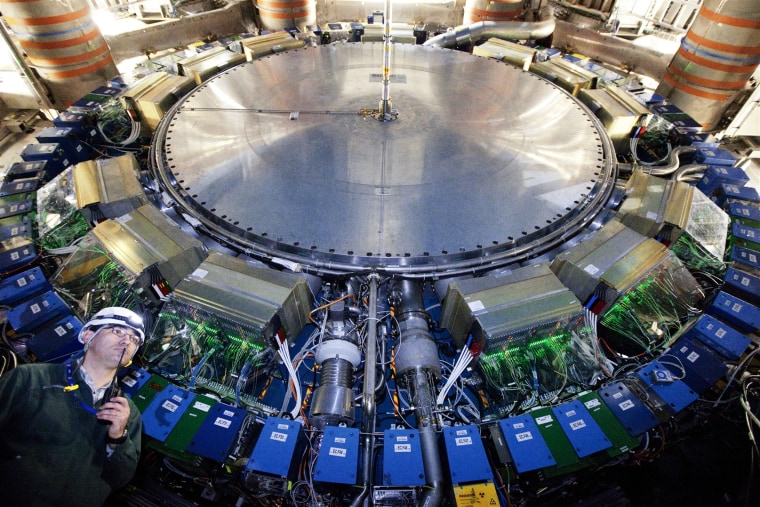The world's most powerful particle collider will be kept running through 2012 rather than taking next year off for an overhaul, Europe's CERN particle physics lab announced today. The change in plans means scientists at the Large Hadron Collider will have more time to track down the Higgs boson and other mysteries of the universe before the extended break — and it also means the machine should be shut down just in time for the Maya apocalypse.
Not that there's anything to the doomsday date. There's no reason why the world should end on Dec. 21, 2012, with or without the LHC. Some folks think dramatic, world-shattering changes will occur on that day because it marks the end of the Maya "long-count" calendar, but that myth has no basis in historical or cosmological reality. (And experts say the date may have been miscalculated, anyway.) Some folks also think the LHC could bring on doomsday by creating catastrophe-causing black holes or strangelets — but there's no evidence for that, either.
The real significance of the LHC's operation in 2012 is that scientists are so pleased with the way the machine has been running that they want to keep up the scientific momentum.
"With the LHC running so well in 2010, and further improvements in performance expected, there's a real chance that exciting new physics may be within our sights by the end of the year," Sergio Bertolucci, CERN's research director, said in today's news release. "For example, if nature is kind to us and the lightest supersymmetric particle, or the Higgs boson, is within reach of the LHC's current energy, the data we expect to collect by the end of 2012 will put them within our grasp."
Right now, the LHC is closed for maintenance, but it's due to start up again in February. The new schedule, approved by the CERN's managers over the past few days, calls for operations to resume at the tried-and-true energy of 3.5 trillion electron volts per beam. CERN expects to increase the LHC's data collection rate by at least a factor of three over the next year, potentially allowing scientists to see the first hints of new phenomena by the end of the year. But one year would not provide enough time to "turn those hints into a discovery," CERN said.
So instead of shutting the LHC down for a yearlong series of upgrades, as previously planned, CERN said it would take a "short technical stop" at the end of 2011, then go back into operation for 2012. The big upgrades would be done during 2013, and in 2014 the LHC would be back in business at its full design energy of 7 TeV per beam.
One of the LHC project's primary goals is to detect the Higgs boson, which is the only particle predicted by current theory that has yet to be found. The Higgs particle, along with its associated field, is thought to play a role in endowing some particles with mass while leaving others (such as photons) to go massless. Research at the LHC could shed new light on other fundamental questions as well: Are there whole classes of supersymmetric particles (or "sparticles") that have gone undetected to date? Might some of those sparticles account for dark matter, which can't be seen but can be detected by its gravitational influence? Is it possible that we live in a world of 10 or 11 dimensions? Why does it look as if matter won out over antimatter when the universe came into being? What's the nature of the primordial soup that existed just an instant after the big bang?
For more about the LHC and its role in solving the mysteries of the universe, delve into our special section about "The Big Bang Machine." And for more from the 2012 watch, check out these stories:
- Stressed by storms and supernovas?
- Solar cycle sparks doomsday buzz
- Alien invaders vs. the truth squad
- The end is not near
If you're looking for an additional antidote to 2012 hysteria, check out 2012hoax.org. Join the Cosmic Log community by hitting the "like" button on the blog's Facebook page or following b0yle on Twitter. You'll even find a reference to 2012 hype in a chapter of my book, "The Case for Pluto."
